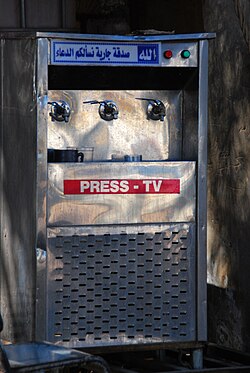Religion:Sadaqah Jariyah
In Islam, continuous charity or ongoing charity (Arabic: صدقة جارية) refers to any act that continues to benefit humanity even after the death of its initiator.[1] In other words, whoever leaves a beneficial legacy for humanity continues to be rewarded for it even after their passing.[1][2]
On the authority of Abu Hurairah that the Messenger of Allah said, "When a person dies, his deeds come to an end except for three: Sadaqah Jariyah (a continuous charity), or knowledge from which benefit is gained, or a righteous child who prays for him."[3][4]
Examples
Examples of ongoing charity in Islam include:
Planting a tree: Planting trees is recommended in Islam, as it provides three essential benefits: consuming its fruits, seeking shade under it, and utilizing its wood.[1]
Building a Water Well: Building water wells is also recommended, as it facilitates access to water, serving as ongoing charity since people continue to benefit from it even after the person who dug it has passed away.[5]
Building a mosque or School or hospital: Constructing mosques is considered a significant ongoing charity, as the one who builds it continues to earn rewards whenever people pray in that mosque.[6]
Leaving a beneficial book.[5]
Leaving Useful Knowledge.[5]
Leaving anything beneficial for humanity is considered ongoing charity.[7]
The Prophet Muhammad said:"There are seven deeds for which a person continues to earn rewards after death: giving knowledge, digging a well, planting a tree, building a mosque, leaving a Quran as inheritance, leaving a child who prays for forgiveness after their death."[5]
References
- ↑ 1.0 1.1 1.2 Islam, Ibrahim (July 10, 2023). "Importance of Tree Planting and Forestry in Islam in the light of Al Quran and Hadith". ModernGhana. https://www.modernghana.com/news/1243484/importance-of-tree-planting-and-forestry-in-islam.html.
- ↑ Adilah Hasbullah, Nurul; Ab Rahman, Asmak (2023-10-16). Higher Education Finance and Islamic Endowments. London: Routledge. ISBN 978-1-003-43597-6. http://dx.doi.org/10.4324/9781003435976.
- ↑ Imam, Muslim (in Arabic). Riyaqd As Salihin. Book 13. pp. hadeeth 8.
- ↑ Nurul Inayah (2023-01-13). "Cash Wakf Implementation Viewed From Bi Al-Urfi Ijtihad Methodology". J-Reb: Journal Research of Economic and Business 2 (01): 1–8. doi:10.55537/jreb.v2i01.536. ISSN 2828-3716. http://dx.doi.org/10.55537/jreb.v2i01.536.
- ↑ 5.0 5.1 5.2 5.3 This hadith is classified as Hasan (good) by Al-Albani in "Sahih At-Targhib" (959).
- ↑ Sayilgan, Salih (2021-09-21). Exploring Islam: Theology and Spiritual Practice in America. Fortress Press. ISBN 978-1-5064-6803-7.
- ↑ Zainal, Noor Saliza (2021). "An overview of islamic welfare and mobilization of e-Sadaqah Jariah / Noor Saliza Zainal …[et al.."] (in English). Journal of Contemporary Social Science Research 5 (1). https://ir.uitm.edu.my/69200/1/69200.pdf.
This article needs additional or more specific categories. (January 2024) |
 |


